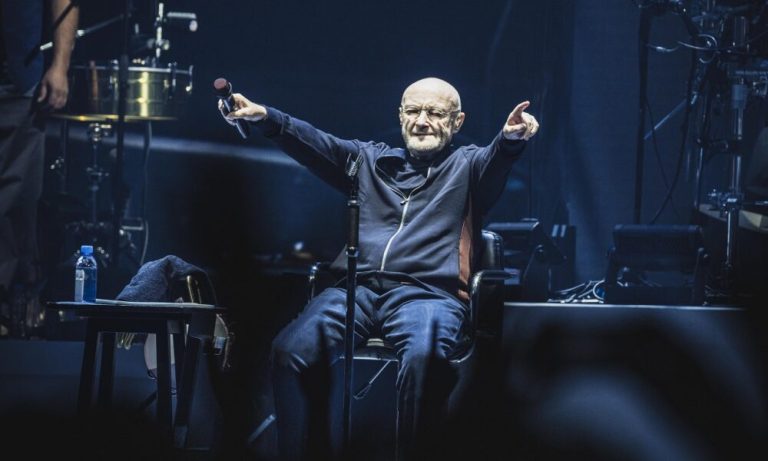“I took my time getting back,” the Genesis drummer says of his recent “Not Dead Yet” tour. “I didn’t know if my audience was still there.” Our interview with Phil Collins.
In the 80s, there was no harder-working rock star than Phil Collins. His solo career exploded in January 1981, with the release of his first single “In the Air Tonight”, the launch of a long series of successes that would punctuate the decade. At the time, he continued to record and tour with his band, the aptly named Genesis, and even began an acting career, landing the lead role in the film Buster released in 1988. In the midst of all this, he also made himself available as a producer and drummer for Robert Plant, Eric Clapton, Paul McCartneyAdam Ant and many others.
Two years after having reissued his entire solo repertoire with various special editions, he is now turning to an upcoming four-disc collaborative box set, called “Play Well With Others”which arrives in the bins on September 28. For the occasion, Collins spoke with WECB US about this new collection, its world tour “Not Dead Yet”his health of course, and finally the possibility of recording his first album since “Testify”released in 2002.
Who came up with the idea for “Plays Well With Others”?
Phil Collins: I do not remember. It’s been in the works for a few years. I think that at the time of my reissues, someone had this bright idea. It’s a bit complicated with all these licensing fees. I came in with the songs I wanted to have on the record and left it all to the lawyers.
Were there any songs you couldn’t get because the rights were frozen?
PC: Not that I know. One song that I absolutely wanted to have was by Steve Winwood, but he told me that he was going to do a live album and that he preferred to keep it. It was just a matter of going through everything I’ve collected over the years. Most of the pieces, I believe, were accepted.
It’s interesting to know that this compilation begins with your pop group Flaming Youth, long before Genesis. Few people have listened to this music…
PC: good luck to them *laughs*. I remember quite a few things from the 70s. For me, CDs 2, 3 and 4 are better than the first CD. Even if everything is there. If you don’t like it, skip it.
There are a lot of songs with Brian Eno. Did you first meet him during the sessions for “Lamb Lies Down on Broadway”?
PC: Yes. He composed “Taking Tiger Mountain” and we did “The Lamb” on the floor below. Peter (Gabriel, editor’s note) and other guys were big fans of Roxy (Music). For my part, I didn’t count myself in Roxy’s camp (…) but I suppose that from that moment on, we got along well, since he subsequently called me to help him on “Another Green World”, “Before and After Science” And “Music for Films”. These sessions were very informative, a new and different way of working. It was a far cry from Genesis.
How did you end up on John Cale’s “Pablo Picasso”?
PC: Again, I don’t remember how these things happened. I remember the studio. I remember the day. There was me and guitarist Chris Spedding, and maybe Brian Rogers was on bass, I don’t really remember. But I was called to play on this album. It was interesting because he was one of those artists who worked on vocals at the same time as instrumentals. I haven’t seen him since. It was the only time I worked with him.
How do you remember the conception of the drum sound on Peter Gabriel’s “Intruder”?
PC: Like it was yesterday. This was at a time when Peter didn’t really have a band. I was in a tough situation and going through a divorce. I completed most of the demos for the record “Face Value” and I said to him: “If you need a drummer, man, I’m here.” I’m free. » He called me and I went to his house in Bath, accompanied by two other musicians: John Giblin and Jo Partridge. We lived there for a month, I played every day, we helped him prepare some songs that were going to appear on the third album.
As soon as I arrived, Peter said: “Take the cymbals away. I don’t want any metal on the record. » I thought it was a bit stubborn of him, but after all, it was his album. We started with the producer Hugh Padgham to put tom-toms where there were the cymbals and I tried to play, to feel comfortable. I asked Hugh for feedback on what I was playing. Peter said: ” What are you playing ? » I said : “I play with sound. » He has answered : ” I like. Give me that for 10 minutes. »
That’s what I did. At the end of the session I said: “What are you going to do with it?” » He said : ” I do not know yet. » So I asked: “Can I have a copy?” » because I felt like I owned it in some way. I received a copy and continued: “Can I get some credit, at least?” If I can’t use it, I would like to have credit. » He accepted and I began to form strong ties with Hugh Padgham, who also helped me on several Genesis records.
It’s amazing that you found time in the 80s to do all these sessions, as you went back and forth between Genesis and your solo career, also doing countless gigs.
PC: I do not know. I had a patient wife, I suppose. I saw myself a bit like Mr Incredible on the way to his wedding, suddenly work calls me and I say to myself: ” I can do it. I have the time. » Obviously, there are only 24 hours in a day. But everything is possible.
Even if you have been cut off from All Things Must Pass” by George Harrison, Paul called you to play on “Press to Play.” You were finally on a Beatles record!
PC: Hugh Padgham was the engineer on this record. I got the call, grabbed my drums and went to the studio. It certainly wasn’t one of his best songs, but Townshend was there to play guitar. It was great because when Pete Townshend smiles while he’s playing, you know you’re doing something cool. Wix Wickens, who is now in Paul’s band as a keyboard player, was also there. It was an interesting day. Linda McCartney was there – she took a photo. I received a very beautiful album from her.
https://www.youtube.com/watch?v=tIeDGKb-WpY
How is the tour going? You were in South America a few months ago.
PC: We traveled through Europe last year, then South America. We’re going back to America in October, just for a few weeks. We’re supposed to do Australia early next year, too. It’s a lot of fun, I must say. I didn’t think I would ever repeat it. My son (Nicholas, editor’s note) plays the drums. He was totally accepted by this group of tough guys. They were all very proud and supportive. Everything went as planned. As long as we find somewhere to go and have some breaks, we will continue the concerts.
Were you afraid that singing while seated would change the dynamic of the concert?
PC: Yes. I used to run everywhere like crazy. I was afraid people would ask for more. But one day, an English critic pointed out that there was a sort of graceful crescendo. I go on stage and sit there all night. The group therefore redoubles its energy. That means the audience is focused on the music, and so am I. It’s a little different for me, but it’s physically impossible for me to stand for two hours without feeling actual pain.
“Can’t Turn Back the Years” sounds great on stage.
PC: It’s one of my favorite songs. It’s perfect for an arena. I’m very lucky that Nic plays drums. When he plays with a drum kit, he sounds a lot like me. He also has a lot of Chad Smith and John Bonham in him, but he also has the attitude I had at the time. Everyone in the group is constantly surprised. All of this helps me not have to turn around and say: ” Do not do that. Do this. » It has everything you need. He understood.
With a song like “Can’t Turn Back the Years,” do you ever find it difficult to sing because it goes back to a painful time in your life?
PC: No. It allows you to project yourself into a place, a time. I love this song. This album (“Both Sides”, editor’s note) is full of my favorite pieces. I don’t find it difficult. I’m not one of those people who relive things. We relive it a little, ok, but not to the point where we go home and cry ourselves to sleep.
Are you surprised that after all these years, since your last album, you are still able to fill stadiums and arenas?
PC: Yeah. To be honest, that’s one of the reasons why I took my time to come back. I didn’t know if there was still an audience. I think the reissues helped prove again that I was still here… as you know, the reviews weren’t always kind. But suddenly I was being re-evaluated and I think it made me feel a lot better about myself.
I remember…I was on this radio show in London just as the European tour dates went on sale. In the time of one page of advertising, everything was sold. It was 15 seconds. I was like, “Oh, my God, I better be awesome now.” » It was the same in America.
Are you writing new songs? Are you thinking of recording an album?
PC: It will have to be. 16 years have passed since the release of the last album. I didn’t realize it was that long. I have a small studio in my house. ! There is me, my lady, and we have an office in the same room, so the busier the office, the less likely I am to go there. I’m taking notes, I have some ideas…
How is your health ? Have you gotten stronger over the years since your surgeries?
Not particularly, no *laughs*. But health is good. A back operation left me with a paralyzed right foot… I still have a little trouble playing the drums. But in general, health is good.






